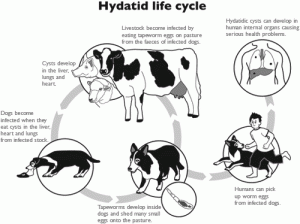Read the latest information on
Foot-and-mouth disease

Hydatid lifecycle Image: Tas DPIPWE
Hydatid disease is back in the spotlight after the National Sheep Health Monitoring Project (NSHMP) identified an increased incidence of the infection in Queensland and New South Wales last year.
The disease is one of the 10 animal health conditions the NSHMP monitors that have the potential to increase meat processing wastage or reduce farm profit through productivity losses. It hasn’t been a significant problem since good farming practices brought the condition under control in the 1950s.
However, a recent increase in the disease is a reminder to producers that the condition still exists and that they need to be aware of its causes, effects and how to reduce the risk of infection.
The condition is caused by tapeworms that produce large cysts in the organs of intermediate hosts such as sheep. Dogs usually carry the tapeworms after consuming infected offal or other material that has come into contact with cyst fluid. Despite showing no signs of the disease themselves, the faeces of host dogs contain eggs that can contaminate the grazing paddocks of sheep and cattle, causing livestock infection.
As a result, producers incur losses due to the condemnation of edible meat by-products associated with the presence of cysts or because of the premature death of infected livestock. If not disposed of quickly, these contaminated carcasses can be eaten by dogs on the property, restarting the hydatid disease cycle.
As hydatid disease is primarily spread by domestic and wild dogs, most prevention strategies focus on establishing good biosecurity practices around these animals. Producers should ensure dogs on their property are wormed according to the product’s instructions every four weeks and weigh them prior to worming to ensure the correct dosage is administered. Dogs should be fed only commercially manufactured products and never allowed to consume uncooked offal as this may be contaminated.
Producers should also maintain fencing to prevent foxes and wild dogs from accessing their property and immediately remove all livestock carcasses from their land. As the disease can spread to humans, people who come into contact with dogs should always wash their hands afterwards.
By incorporating these simple biosecurity measures in their daily practice, producers can minimise the risks associated with hydatid disease.